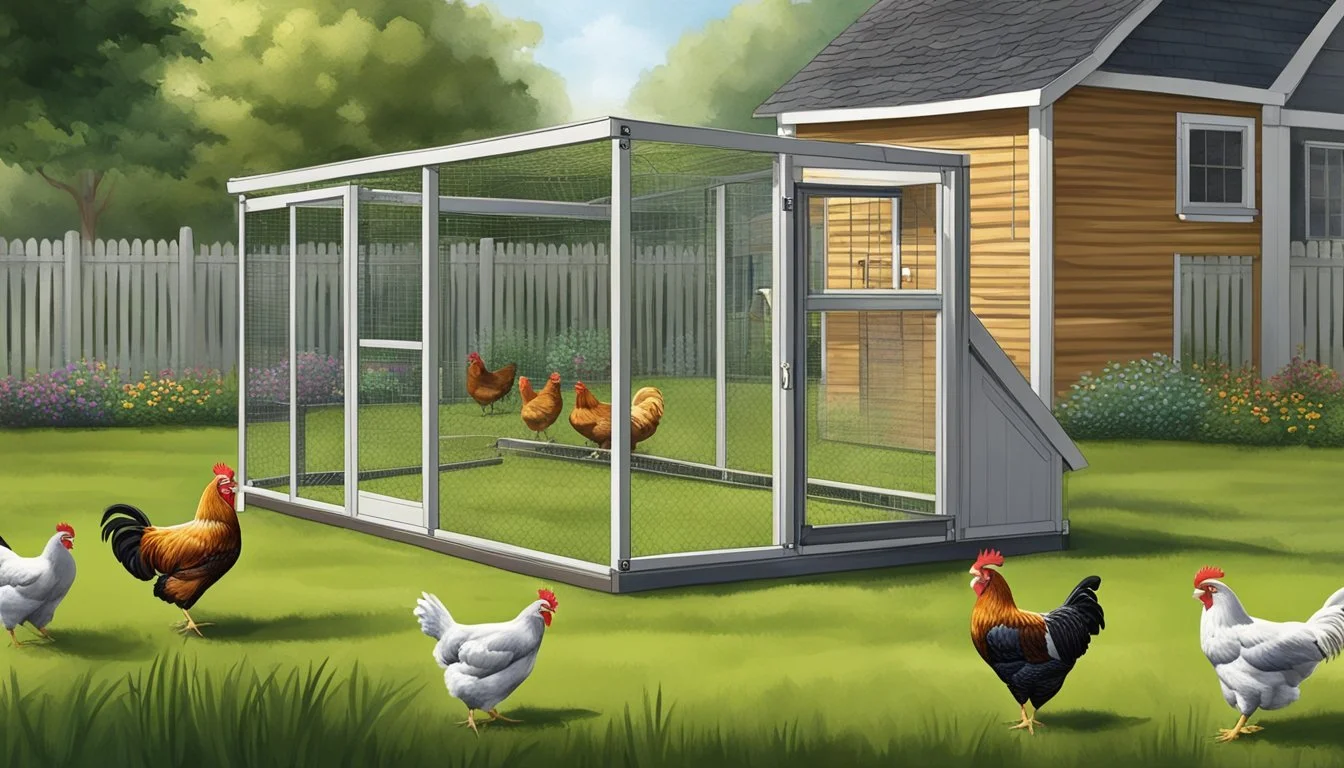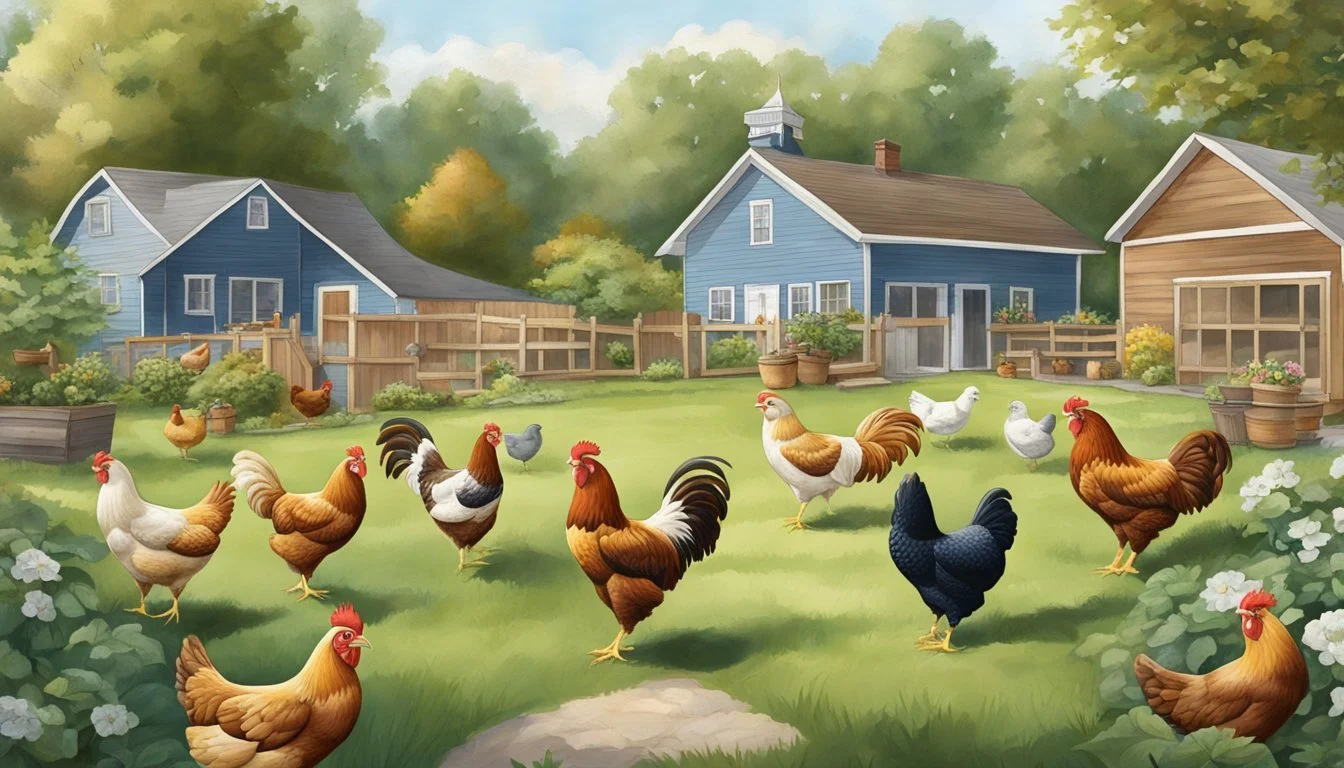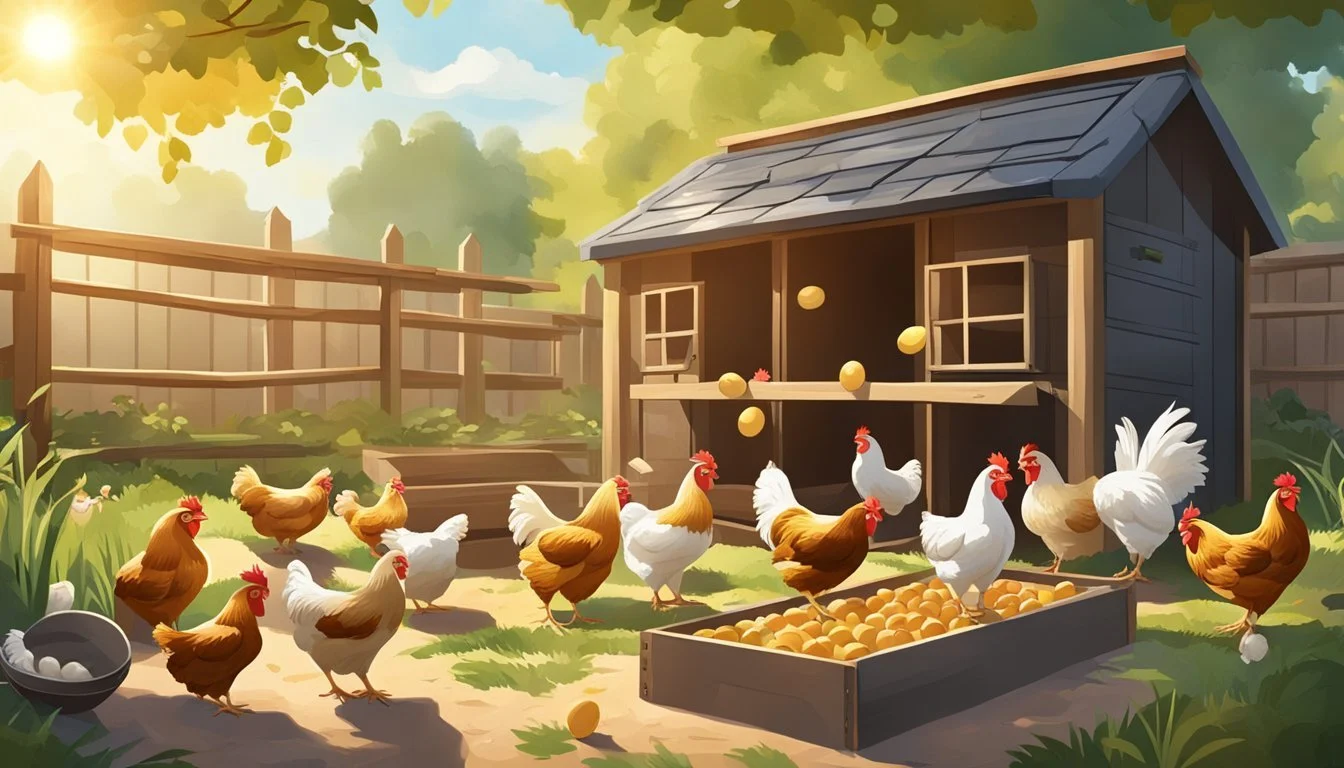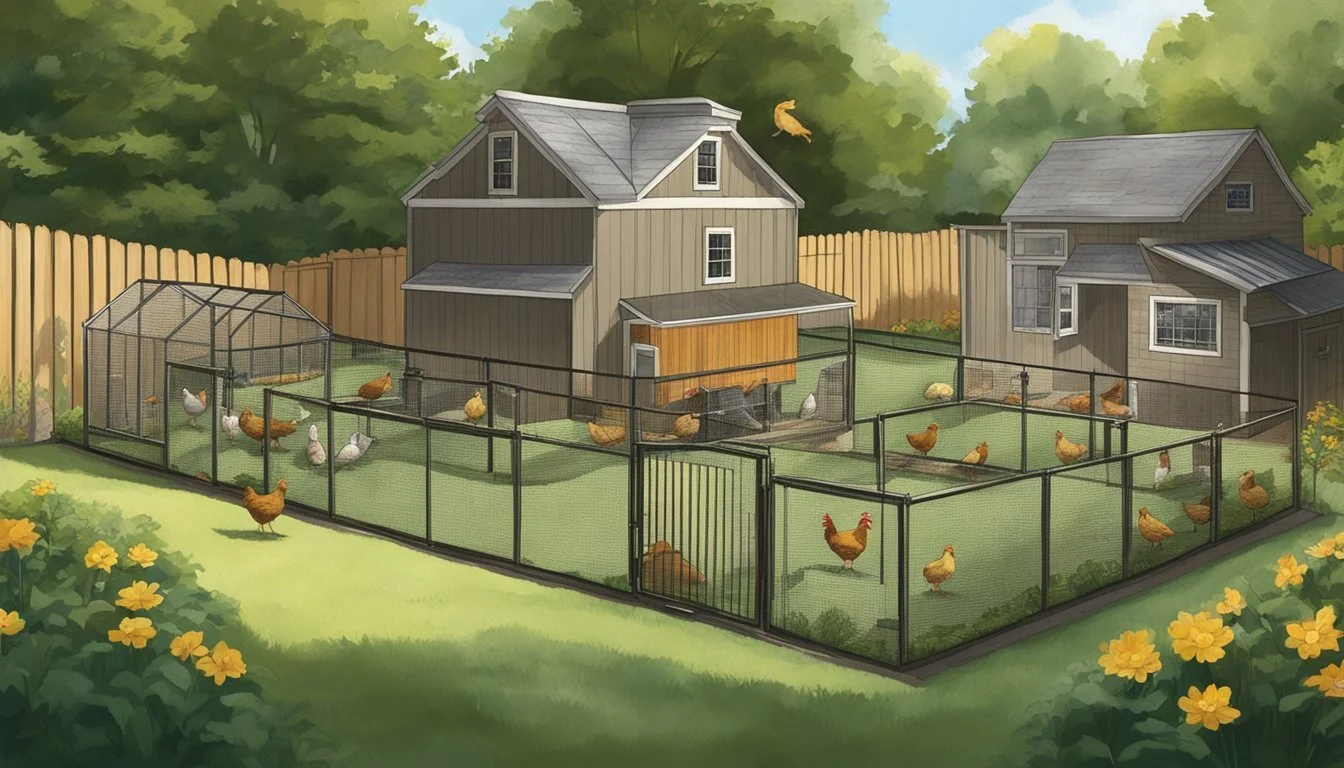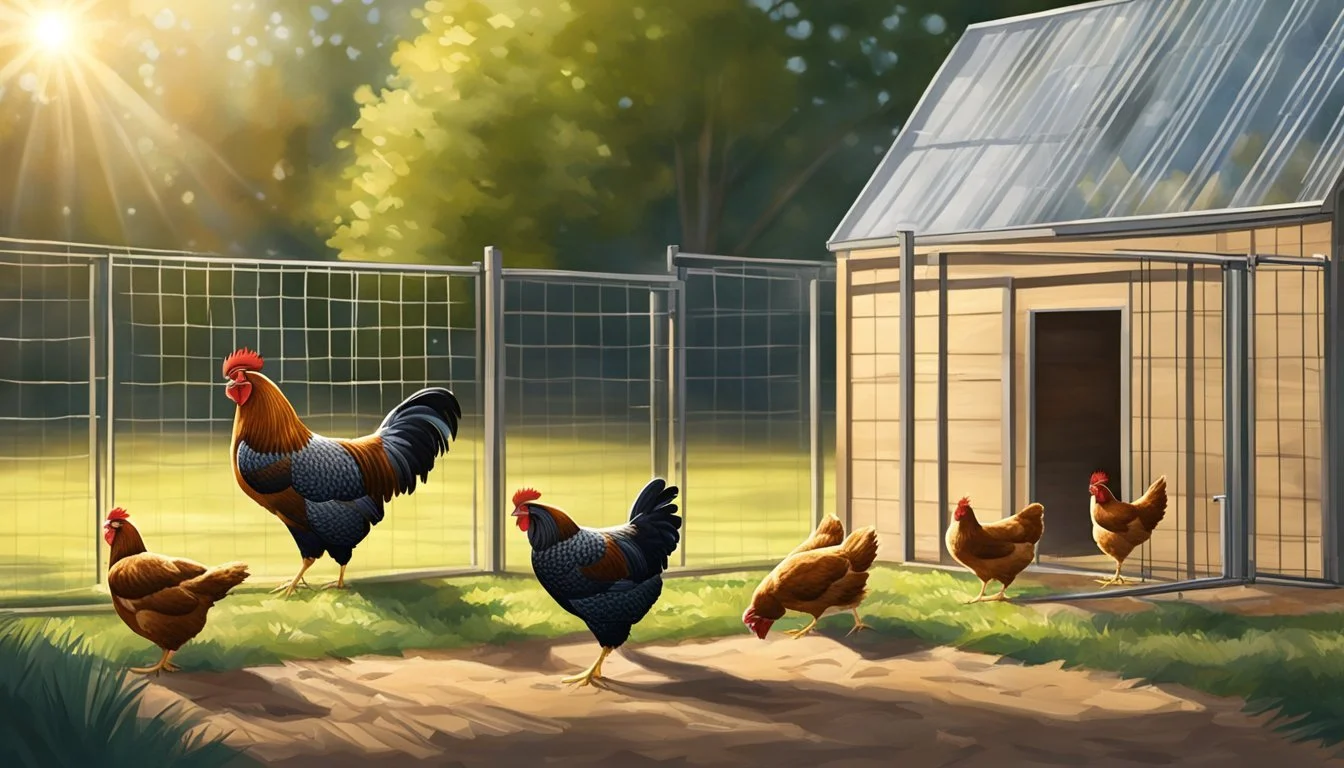Raising Backyard Chickens in Elkhart, IN
A Starter Guide for Urban Poultry Farmers
Raising backyard chickens has become a popular endeavor for residents looking to embrace a more sustainable lifestyle, providing a source of fresh eggs and the joy of animal stewardship. However, in Elkhart, Indiana, individuals with an interest in chicken keeping must navigate local ordinances to ensure compliance with laws governing the practice. Local regulations stipulate a clear distinction between rural and urban areas, with livestock classification including chickens, making the practice subject to land and location criteria.
In Elkhart County, the rules for keeping chickens are stringent, with a requirement of at least three contiguous acres if owning livestock. Therefore, residents of more densely populated city limits face restrictions, and backyard chicken raising within these limits remains illegal. This presents a challenge for urban dwellers who seek the benefits of raising their own chickens but are constrained by the current legal framework.
The conversation around urban chicken raising in Elkhart is ongoing. Community members have expressed interest in adjusting city ordinances to become more backyard chicken-friendly, mirroring trends in other Indiana locales where revised policies have made small-scale chicken keeping more accessible. These areas, which have successfully integrated backyard chickens into city life, often have limits on the number of hens and exclude roosters, balancing urban living with the desire for homegrown food sources.
Local Regulations and Zoning Laws
Elkhart, Indiana, residents who wish to raise backyard chickens must adhere to specific local regulations and zoning laws to ensure they are in compliance. These laws determine the legality of raising chickens, the number allowed, and the type of structures permitted.
Understanding Elkhart's Backyard Chicken Laws
In Elkhart County, backyard chickens are classified as livestock. It is important to note that different rules may apply to properties depending on whether they are located within city limits or in the county. For residential areas typically identified by a five-digit house number, a minimum of three contiguous acres is required to legally keep livestock, including chickens. Before obtaining chickens, residents should verify property zoning classifications and any applicable ordinances to ensure compliance.
Navigating Zoning and Permits
When considering raising backyard chickens, residents must be proactive in engaging with local zoning and permit regulations. The Elkhart County Zoning Ordinance established on December 15, 2014, with an effective date of February 2, 2015, outlines land use classifications, and any subsequent amendments could impact chicken raising practices. Residents should reach out to the Elkhart County government or its Planning & Development department for the latest information on licensing requirements, potential restrictions on the number of chickens allowed, coop construction standards, and setback regulations for coop placement relative to property lines. It's essential for chicken owners to stay informed of updates, as regulations can evolve, impacting how one may legally raise chickens in their backyard.
Choosing the Right Chicken Breed
Selecting the right breed for a backyard flock in Elkhart, IN is crucial, as it involves considering egg production capabilities and suitability to local climate conditions.
Popular Breeds for Backyard Flocks
When it comes to backyard flocks, certain chicken breeds stand out for their adaptability and productivity. In Elkhart, the following breeds are particularly favored:
Leghorn: These birds are known for their prolific egg-laying capabilities, often producing a substantial number of white eggs.
Plymouth Rock: Adaptable and hardy, Plymouth Rocks are renowned for their consistent egg production and docile nature.
Rhode Island Red: A versatile choice, Rhode Island Reds are tough against the elements and reliable layers of brown eggs.
Each breed has specific strengths that make them suitable for backyard flocks. Rhode Island Reds and Plymouth Rocks, for example, are good for colder climates due to their robust constitutions.
Breed-Specific Needs and Temperaments
Breeds not only differ in their production but also in their care requirements and temperaments:
Leghorn: These chickens require secure housing as they are flighty and active.
Plymouth Rock: They generally have a calm disposition, making them a good choice for families and interactive backyard settings.
Rhode Island Red: Known for their hardiness, they can be both assertive and friendly, but also fare well in more independent settings.
When raising chickens as livestock in Elkhart, it's essential to match the breed to its intended purpose, whether for egg production, show, or as pets. One must also be mindful of the temperament that best aligns with the owner's ability to provide care and interaction.
Basic Requirements for Raising Chickens
When embarking on the journey of raising backyard chickens, one must prioritize the living environment and provision of essential supplies. Proper housing, space, and equipment are foundational to maintaining a healthy flock.
Housing and Space Considerations
Coop Design: A secure chicken coop is critical to protect chickens from predators and harsh weather. It should provide at least 2-3 square feet of interior space per chicken.
Ventilation: Adequate airflow prevents moisture buildup and keeps the air fresh.
Nesting Box: Each coop should contain at least one nesting box for every three hens, with dimensions of roughly 12x12x12 inches.
Fence: Enclosing the coop with a sturdy fence deters predators and provides a safe range area.
Chickens also require an outdoor space for foraging and exercise. This area should offer 8-10 square feet per chicken to prevent overcrowding and promote healthy behaviors.
Necessary Equipment and Supplies
Feeders and Waterers: Chickens require consistent access to food and clean water. One should install one feeder and waterer per 4-6 chickens to avoid over-crowding and ensure equal access for all birds.
Bedding: High-quality bedding, such as straw or wood shavings, should cover the coop floor to absorb moisture and maintain cleanliness.
Adequate Space: Ensure the coop provides enough space for the number of chickens being housed. Overcrowding can lead to stress, aggressive behaviors, and unsanitary conditions.
Note: The specific guidelines for raising chickens can vary from one location to another. It's important for residents of Elkhart, IN to review local ordinances as there are restrictions on the minimum acreage required for raising livestock, including chickens.
Feeding and Nutrition
A well-balanced diet is crucial for the health and productivity of backyard chickens in Elkhart, IN. Feeding the right type and amount of food, along with necessary supplements, supports their growth, egg production, and overall well-being.
Formulating a Balanced Diet
The foundation of a chicken’s diet should include a variety of nutrients such as proteins, carbohydrates, fats, vitamins, and minerals. Protein is particularly important for muscle development and egg production; typical feed should contain about 16-18% protein for laying hens. Chicks require higher protein levels of about 20-24% to support their rapid growth. Carbohydrates provide energy, which can be sourced from grains like corn, wheat, and barley.
Essential vitamins and minerals must be present in the diet, such as vitamins A, D3, B12, and E, as well as minerals like copper sulfate and phosphorus. Fiber also plays a vital role in the digestive health of chickens. They generally get adequate fiber from grains, although supplementary sources can be provided to optimize digestion.
Choosing the Right Feed and Supplements
When selecting chicken feed, it's important to choose the type that aligns with the chickens' life stages:
Chick starter feed: Designed for chicks up to 6 weeks old, with a high protein content of 20-24%.
Grower feed: Suitable for young chickens from 6 to 20 weeks old, containing 14-18% protein.
Layer feed: Ideal for egg-laying hens, typically with 16-18% protein.
Broiler feed: Best for meat-producing chickens, with a higher protein range of 20-24%.
In addition to traditional feed, chickens benefit from supplements like mealworms, which are an excellent protein source. It’s recommended to provide grit to aid in digestion because chickens do not have teeth to grind their food. Additionally, calcium supplements in the form of crushed oyster shells can be offered to laying hens to ensure strong eggshells.
Health and Wellness
Raising backyard chickens in Elkhart, Indiana requires attention to their health and wellness to ensure a productive and disease-free flock. This section will provide guidance on maintaining cleanliness, addressing health issues, and being prepared for emergencies.
Keeping Your Flock Clean and Healthy
A clean environment is crucial for preventing disease in chickens. Regular cleaning of the coop and brooder reduces the risk of parasites and pests. Elkhart residents should invest in proper feeders and waterers that minimize waste and the potential for contamination. Additionally, keeping the chicken living spaces dry and well-ventilated helps to deter the proliferation of harmful organisms.
Feeder Type: Prevent spillage and waste
Waterer Type: Reduce contamination
Brooder Conditions: Spacious, clean, dry
Ventilation: Adequate airflow to reduce ammonia levels
Pest Control: Regularly check for and manage mites, lice, and other parasites
Addressing Common Health Concerns
Chickens may face a variety of health concerns, including respiratory infections, parasites, and injuries. Elkhart chicken owners should monitor for signs of illness such as lethargy, decreased appetite, or abnormal droppings. Immediate isolation of sick birds is prudent to prevent the spread of disease.
Signs of Illness: Observant for unusual behaviors
Quarantine: Isolation measures for affected birds
Veterinary Care: Consult with local avian veterinarians for diagnosis and treatment
Emergency Preparedness and First Aid
While Elkhart County residents must abide by local regulations, it is important they are also prepared to handle unexpected poultry health emergencies. Having a first aid kit and knowledge of basic first aid for poultry can make a difference during critical moments.
First Aid Kit Contents: Gauze, scissors, antiseptic spray, tweezers
Knowledge: Understanding of how to administer basic first aid to injured chickens
Predator Deterrence: Secure housing and methods for protecting against local predators
Maintaining a flock's health and wellness through proactive measures not only keeps the chickens happy but also provides peace of mind to the owner.
Egg Production and Care
Homeowners in Elkhart, Indiana who raise chickens for egg production prioritize the health and output of their layers. Proper care and handling are crucial for maintaining a consistent supply of fresh eggs.
Maximizing Laying Potential
In Elkhart, Indiana, layers typically begin laying eggs at 20 weeks of age and can continue to do so effectively for several years. Annual egg production often decreases as hens age, with a corresponding increase in egg size and a decrease in shell quality. To maximize laying potential, owners should ensure:
Optimal Light Conditions: Layers require 12 to 14 hours of daylight to maintain peak egg production. Artificial lighting can supplement shorter daylight hours during the winter months.
Proper Nutrition: A diet of high-quality feed is vital. The feed should have an appropriate level of protein:
0-8 weeks: 18-20% starter feed crumbles
8-14 weeks: 16-18% starter/grower
15-18 weeks: 16% finisher
Laying Hens: Maintenance of a balanced layer diet
Stress Reduction: Minimizing stress by providing safe, comfortable housing is essential for consistent egg laying.
Handling and Storing Fresh Eggs
Once eggs are laid, proper handling and storage are vital to maintain freshness and minimize the risk of contamination.
Gathering Eggs: Eggs should be collected at least once a day.
Cleaning: Soil on eggs can be gently cleaned off with fine sandpaper, a brush, or a cloth. Avoid using water as it may remove the protective bloom and allow bacteria to enter the egg.
Storage Conditions: Store eggs at a consistent temperature, ideally in a refrigerator, to prolong freshness. The ideal storage temperature range is 35°F to 40°F (1.7°C to 4.4°C).
By following these guidelines, backyard poultry owners in Elkhart can ensure they have a reliable and safe supply of fresh eggs from their flock.
Reproduction and Breeding
Raising backyard chickens in Elkhart, IN, involves understanding the process of chicken reproduction and breeding, from incubating eggs to brooding chicks. Chicken reproduction is typically a straightforward affair, but it does require some knowledge about incubation periods, genetic considerations, and the actual breeding process.
Incubating Eggs and Brooding Chicks
Once eggs are laid by the hen, they require proper incubation in order to develop into chicks. In Elkhart, those raising chickens must provide an incubation environment that maintains the right temperature and humidity levels for a period of 21 days. Incubators or broody hens can be used to provide this environment. Post-hatching, the chicks enter the brooding stage, which necessitates a warm and safe brooding area to ensure their growth and health during the early days of their lives.
Breeding and Genetic Considerations
Breeding chickens in Elkhart not only requires two sexually mature birds—a rooster and a hen—but also an understanding of genetic factors that can affect future progeny. Sperm transfer typically occurs during a 'cloacal kiss,' after which hens can retain sperm for several weeks to fertilize multiple eggs. Genetic considerations are key when selecting breeding pairs; this directly impacts the health, vigor, and characteristics of the offspring, like egg production, size, and disease resistance. Breeders need to maintain genetic diversity and avoid inbreeding to produce robust flocks.
Coop Management and Upkeep
To ensure a flourishing backyard flock, diligent coop management and upkeep are crucial. These practices maintain the health, safety, and comfort of the chickens.
Daily Routines for a Healthy Coop
Daily maintenance tasks are critical for a coop's hygiene and the wellbeing of its residents. Coop owners should follow a checklist to keep their birds healthy:
Feeders and Waterers: Ensure they are filled, clean, and accessible.
Bedding: Check the condition of the bedding, and remove and replace if it becomes excessively soiled with chicken poop.
Security Check: Inspect the coop for any signs of wear or openings that could allow predators to enter.
Ventilation: Assess the airflow, and adjust as needed to maintain fresh air without causing drafts.
Egg Collection: Gather eggs daily to encourage more laying and prevent breakage.
Long-Term Maintenance and Upgrades
Aside from daily tasks, some maintenance requires less frequent attention yet it's essential for the long-term sustainability of the coop:
Seasonal Cleaning: Deep clean the coop thoroughly several times a year, replacing all bedding and sanitizing surfaces.
Coop Design and Space: Re-evaluate the space periodically to ensure it meets the flock's needs as it grows or changes. Adequate space helps regulate temperature and prevent diseases.
Temperature Regulation: Check and repair any heating or cooling systems with the changing seasons to keep the coop at a comfortable temperature.
Structure and Security: Reinforce the coop structure and predator defenses annually. Check for weaknesses in the coop's integrity that could jeopardize its security.
By adhering to these management and maintenance strategies, owners can provide a safe and productive environment for their backyard chickens.
Protecting Chickens from Predators
In Elkhart, Indiana, common predators such as raccoons, hawks, and even domestic animals pose a threat to backyard chickens. Effective housing design and security measures are critical for safeguarding these birds.
Designing a Predator-Proof Housing
The first line of defense is a well-constructed chicken coop. Walls and roofs should be built with sturdy materials that resist gnawing and tearing. Hardware cloth is recommended over chicken wire, as it has smaller openings and is more durable against predators' attempts to breach the enclosure. All potential entry points, including windows, ventilation holes, and doors, must be secured with hardware cloth.
Ventilation openings should be no larger than half an inch to prevent small predators from squeezing through. It's essential that latches on doors and nesting boxes can withstand curious paws and aren't easily manipulated.
Implementing Effective Security Measures
Beyond coop construction, additional deterrents can be incorporated to enhance the security around the perimeter of the chicken run. Electric fencing can be an effective barrier against cunning predators like raccoons. A fence should:
Be buried at least 12 inches into the ground to prevent digging.
Extend over the run with netting to safeguard against avian predators.
Include an overhang or apron to stop climbers and diggers.
A multi-layered approach is key; this may include motion-activated lights and a secured perimeter that patrols the chicken run, especially during nightfall when predators are most active.
Regular maintenance checks for breaches or signs of attempted entry can alert owners to potential weaknesses before a predator takes advantage. Being proactive in these security strategies helps ensure that backyard chickens in Elkhart, IN remain safe from the wide array of predators they may encounter.
Integrating Chickens into the Local Community
The inclusion of backyard chickens in Elkhart, IN, serves as a platform for increased community engagement and advancing local sustainability. This section examines how individuals and local entities are supporting the integration of chickens within the local community fabric.
Community Interaction and Learning Opportunities
The move to integrate chickens into Elkhart's community is fostering a wealth of interaction and learning opportunities. Residents not only share insights and tips on caring for poultry but also engage in broader dialogs about local ordinances and responsible urban farming. Local workshops and social media groups are becoming a hub for exchanging knowledge, where more experienced poultry keepers can guide newcomers through the essentials of chicken care, from feeding and housing to health management.
Resource-sharing initiatives are also taking root, with individuals pooling together to:
Offer coop tours and share designs that work well in urban settings.
Facilitate skill-sharing sessions on constructing chicken coops from recycled materials.
Create community composting programs that utilize chicken waste to benefit local gardens.
Contributing to Local Sustainability Efforts
Raising chickens contributes significantly to the sustainability efforts in Elkhart. Local individuals and families are reducing their carbon footprint by producing eggs in their backyards, cutting down on the need for transportation and packaging associated with store-bought eggs. Equally, chickens play a crucial role in composting, an organic process that turns waste into valuable fertilizer, thus enhancing soil health and reducing reliance on artificial fertilizers.
Sustainable practices in place that emphasize community contribution include:
Local Food Networks: Homegrown eggs are sometimes shared or sold within the community, highlighting a commitment to local, sustainable food sources.
Waste Reduction: Chicken owners are able to feed food scraps to their poultry, turning potential waste into a resource and lessening the load on landfills.
Through these activities, Elkhart residents not only embrace the practical aspects of keeping chickens but also contribute to creating a greener community rooted in sustainability and shared learning.
Advanced Topics in Poultry Care
When elevating backyard chicken care to more advanced levels, focusing on understanding chicken behavior and exploring free-range and organic practices can both enhance the wellbeing of the chickens and the quality of the produce they offer.
Understanding Chicken Behavior and Social Structure
Chickens exhibit a wide range of behaviors that are indicative of their social structure. This includes establishing a pecking order that determines their hierarchy within the flock. The top chicken, often a rooster, leads the group, while others find their place in the order. Recognizing signs of stress or aggression early on can help maintain a healthy social balance. Roosting bars are crucial; they offer a natural place for chickens to sleep and assert their positions in the hierarchy. Ensure the roosting bars are positioned so that multiple birds can settle in without disturbance.
Exploring Free Range and Organic Practices
Free-range and organic practices are important topics for backyard chicken keepers aiming for sustainability and animal welfare. Free-range chickens are given access to outdoor areas, which allows for natural behaviors such as foraging and dust bathing. This not only contributes to the mental and physical health of the chickens but also impacts the quality of their eggs or meat. Organic practices involve feeding chickens a diet free from synthetic pesticides and genetically modified organisms (GMOs), which complements a free-range approach and fosters overall health. Regulations on organic certification should be adhered to, including adherence to specific feed compositions and land management practices.
Conclusion
Residents of Elkhart, Indiana, are on the cusp of being able to legally raise chickens in their own backyards. The potential amendment of local ordinances will bring new opportunities for urban poultry enthusiasts. However, individuals should remain cognizant of the regulations that come with such a practice, most notably space requirements and potential limits on the number of chickens.
Those considering raising backyard chickens should prepare for the responsibility. Ensuring adequate space, proper care, and compliance with local laws are critical steps. Here are a few brief tips for future backyard chicken owners:
Space: Verify that you have sufficient space for the chickens to roam and nest. Local laws may dictate the minimum required area.
Shelter: Provide a secure and comfortable coop to protect the chickens from predators and harsh weather.
Care: Chickens need consistent access to fresh water and a balanced diet, as well as regular cleaning of their living environment.
Before making any commitment, prospective chicken owners are advised to review Elkhart's finalized regulations upon their release. By doing so, they can ensure not only the welfare of their chickens but also a harmonious relationship with their community.
Appendix
This section serves as a support for readers seeking to enhance their understanding about backyard chicken raising in Elkhart, IN. It includes terminology, reading materials, and local sourcing options for aspiring chicken owners.
Glossary of Terms
Coop: A structure for housing chickens, providing shelter and protection from predators.
Hen: An adult female chicken, known for egg production.
Pullet: A young female chicken who has not started laying eggs.
Rooster: An adult male chicken often kept for breeding purposes and known for their crowing.
Resources for Further Reading
Elkhart County Zoning Ordinance: Details on official policies for chicken raising in Elkhart County.
Urban Chicken Ordinance Draft: Preliminary language for potential city regulations in Elkhart.
Local Hatcheries and Suppliers
Elkhart Farm Supply: A supplier of feed, equipment, and chicks for backyard poultry enthusiasts.
Goshen Hatchery: Known for a variety of healthy chicks and poultry farming supplies.

